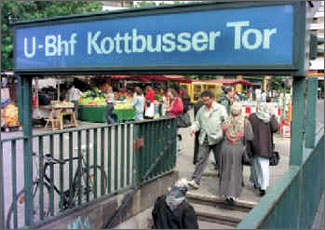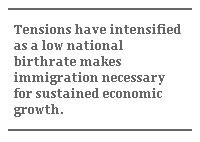Germany Deadlocked Over Immigration Policy
Germany Deadlocked Over Immigration Policy

BONN: German industry and banking have been at the forefront of the economic drive that has brought the world closer together. Yet Germany is having trouble adjusting to the impacts of globalization within its own borders. A three-year deadlock over an immigration bill that has divided German opinion is proof that economic globalization does not necessarily translate to the emergence of an inclusive society.
Over the years, German society has become increasingly diverse. The proportion of foreigners has jumped from a mere 1.1% in 1950 to almost 10% half a century later. Many of these minority groups - particularly a two million strong Turkish community - date back to the “guest worker” (Gastarbeiter) program of the 1950s and 1960s - a period of increasing international economic integration. At the time, many expected the recruited low-level “guest” labor to eventually return home. But as it turned out, more than half of the foreign workers stayed together with their families, forever altering the social fabric of a country that continues to view itself as a non-immigrant society.
Tensions over immigration policy have intensified in recent years as an extremely low national birthrate makes immigration necessary for sustained economic growth. According to the prestigious German Institute for Economic Research (DIW), only an annual influx of about 140,000 people can offset Germany's rapid decrease in potential workers and ensure the survival of the national retirement and health care systems. As a result, the bargaining position of employers' associations lobbying for the targeted immigration of needed specialists is vastly improved.

Nevertheless, there has been no legal framework for recruiting foreign labor since the “guest worker” program ended in 1973. In 2000, the Schröder government attempted to adapt the resident alien laws to the challenges of the time. In order to attract badly needed skilled workers - particularly computer programmers from countries like India - officials proposed that certain expert groups be given temporary Green Cards. Likewise, they suggested that Germany establish selective immigration with fixed annual quotas and issue permanent residence permits to foreign investors. The proposed policies also included reforms on political asylum laws for refugees and a legal framework that would grant citizenship to German-born children of guest workers.
Once the bill was packaged, what ensued was an odyssey through the institutional jungles of German politics. The bill spent two years in the German legislature before both houses passed it in July 2002, only to have it struck down by the Supreme Court that December. The Court did not question the bill itself, but maintained that the way it had passed through the Upper House (Bundesrat) had been unconstitutional. Indeed, the highly contested final vote in the Upper House had caused tumultuous scenes of an almost unprecedented proportion.

Today the immigration bill is nowhere closer to being passed than when it was first proposed in early 2000. Yet the debate continues and the demarcation lines remain remarkably unchanged. German society is challenged by the bill not simply because it seeks to change the way the influx of resident aliens is regulated, but because it touches upon deeply engrained notions of citizenship and national identity.
Germany's current citizenship codex dates back to the heydays of nationalism. In 1913, German law defined citizenship exclusively in terms of blood ties (jus sanguinis) so as to prevent immigrants - primarily Poles - and their children from gaining citizenship. To this day, a child of foreign descent that is born and raised in Germany is still not automatically entitled to apply for a German passport. Consequently the term “immigrant” is neither a legal category nor a political status in Germany, and all non-indigenous inhabitants of Germany - apart from EU-citizens - are either “guest workers,” refugees granted political asylum, or so-called “resettlers” (Aussiedler). The latter could claim German ancestry and arrived after the lifting of the Iron Curtain from Eastern European countries.

While all major political parties agree that the legal situation needs to be revised, strong disagreement about the parameters of change continues. Generally speaking, Christian Democrats (CDU) remain vehemently opposed to immigration from most non-European societies. In regional elections conservative politicians have tried to raise fears of job losses and have even played the race card. Most famously, the CDU of North Rhine-Westphalia had to withdraw its anti-Green Card slogan “Kinder statt Inder” (Have “children rather than [let in] Indians”) after an avalanche of protests. Other Christian Democrats treat the presence of foreigners in Germany as a challenge to domestic security. And the conservative vice leader in the German parliament, Wolfgang Bosbach, recently described his party's position in the following manner: “Concerning immigration the government goes too far, concerning integration not far enough. We don't want a multicultural society; we don't want more immigration.”
Behind the debates on concrete immigration policies looms a deep division about the meaning of being German in today's world. While most conservative politicians and intellectuals shy away from requiring complete assimilation of alien residents, they still emphasize “that there should be no doubt about who has the rights of a house owner and who is the guest” (CDU general secretary Laurenz Meyer). More concretely, this means that German immigrants should strive to fit into Germany's social order and cultural heritage, which many conservatives define as a legacy of Christianity, Roman law, the Enlightenment, and Greek philosophy. The newly coined word of a “Leitkultur” - translated either as “guiding culture” or “leading culture” - has turned into a key term in this debate. Christian Democrats tend to argue that immigrants need to accept the German “Leitkultur” in exchange for political privileges and as a precondition for a stable society.

On the other side of the spectrum, the Social Democrats, the Green Party and particularly the church councils maintain that a consistent German culture and value-system is a mere illusion. They maintain that German society is evolving kaleidoscopically with many different lifestyles emerging in rapidly changing times. Consequently, they argue, newly arrived immigrants cannot be asked to adapt to a non-existent uniform German culture. They should only be expected to adhere to the principles of the constitution, its implicit normative values, and its rules for conducting conflicts of interest. The ideal immigrant would therefore be both malleable and willing to contribute to German society as a responsible citizen.
Turkish community representatives and likeminded politicians have long argued that the humiliating status of a "foreigner" prevents minorities from identifying with German society and politics. Their marginalized status, they hold, breeds cynicism and isolated communities that are no longer connected by any kind of social consensus. Thus, fears about multiculturalism and the belief in a solid German "Leitkultur" could actually undermine that greatest of objectives - an integrated society. As an article recently published in a German-Turkish weekly stated: "We are sick of playing the role of the victim for you. You demand integration and inclusion. Nobody asks us whether we like the body in which we are supposed to integrate ourselves. We want to change that body."
Dominic Sachsenmaier is Assistant Professor in the Global and International Studies Program, University of California, Santa Barbara. He is editor of Reflections on Multiple Modernities: European, Chinese and other approaches. (2002).